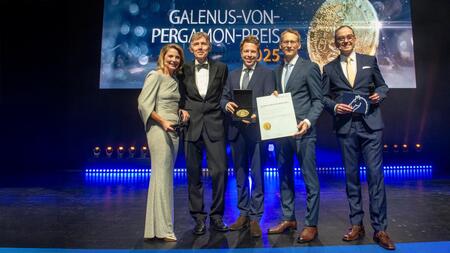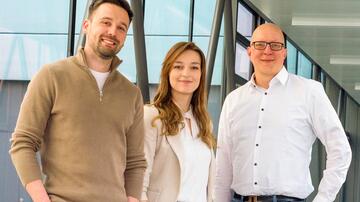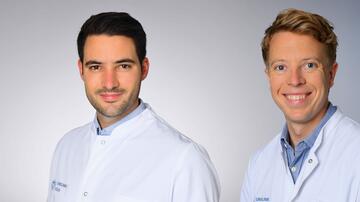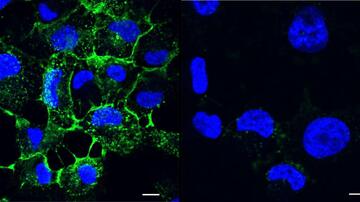Research into alternatives to antibiotics wins Galenus von Pergamon Prize
DZIF researchers at University Hospital Cologne were honored in the "Basic Research" category.
Dr. Alexander Simonis (center) and Prof. Dr. Florian Klein (second from right) accepted the award. Their colleagues, Prof. Dr. Jan Rybniker and PD Dr. Christoph Kreer, who were also honored, were not present at the award ceremony. The prize was presented by Prof. Thomas Eschenhagen (second from left). The gala was hosted by Yve Fehring (left) and Matthias Gabriel (right).
In the future, antibodies against the virulence factors of Pseudomonas aeruginosa may serve as an alternative to antibiotics. DZIF scientists at University Hospital Cologne have been awarded the 2025 Galenus von Pergamon Prize for Basic Research for their work in this field.
The researchers have developed an antibody that targets the hospital pathogen Pseudomonas aeruginosa. This bacterium often causes severe infections and develops antibiotic resistance. The antibody is an alternative to antibiotics, though it is not an antibiotic in the traditional sense. This is one reason why the Cologne team, consisting of Jan Rybniker, Florian Klein, Alexander Simonis, and Christoph Kreer, prevailed over eight other nominated research groups, explains Prof. Dr. Thomas Eschenhagen, a Galenus juror and director of the Institute of Pharmacology at the University of Hamburg. This year, a total of three groups were nominated for their work on antibiotic resistance. "This is no surprise, as antibiotic resistance is one of the major problems in medicine," says Prof. Eschenhagen.
Antibodies isolated from chronically infected patients
DZIF scientists Prof. Dr. Jan Rybniker and Prof. Dr. Florian Klein of the University Hospital Cologne, and their teams isolated and characterized antibodies from patients who are chronically infected. These antibodies target the bacterium's virulence. The team tested the antibodies in a mouse model. There, the antibodies suppressed bacterial growth with a level of effectiveness similar to classic antibiotics. The antibodies were also effective against resistant strains. The jury was impressed by this innovative and clinically relevant research, as Prof. Eschenhagen explains: "The group is actively advancing clinical development, so we foresee a relatively rapid application in patients."
The award winners are confident that their research will pave the way for new methods of combating microbial antibiotic resistance. Their findings thus far have shown that there are other ways to treat bacterial pathogens. These findings could possibly be applied to other bacterial pathogens as well.
Focus on type III secretion system (T3SS)
The Cologne-based research teams, led by Prof. Rybniker, Dr. Simonis, Prof. Klein, and PD Dr. Christoph Kreer, are working on alternative treatment for P. aeruginosa infections. They are focusing on the so-called type III secretion system (T3SS). This system can inject bacterial toxins directly into host cells via the PcrV protein. The starting point for the work was the blood plasma of chronically infected individuals, which showed high inhibitory activity against PcrV. The researchers isolated specific B cells from the plasma. Using single-cell analysis, they then succeeded in obtaining human monoclonal antibodies (mAbs) against PcrV. In experiments with mice, these antibodies reduced both the number of bacteria and the damage to lung tissue with a level of effectiveness similar to that of conventional antibiotics. The antibodies also had a protective effect against particularly resistant strains of P. aeruginosa.
Initial tissue compatibility tests ("tissue cross-reactivity") showed no adverse reactions, a known advantage of fully human mAbs. Pharmacokinetic studies on the duration of action in the body revealed that the mAbs have a long half-life, which could enable prophylactic use. As part of the DZIF project PANTIPA, Jan Rybniker, Alexander Simonis, and Florian Klein are preparing a clinical phase I study.
Sources: Press releases of Cologne University Hospital and SpringerMedizin
- About the Galenus von Pergamon Prize
The Galenus von Pergamon Prize is a prestigious scientific award for pharmacological research in Germany. It has been awarded since 1985 and is sponsored by Springer Medizin Verlag GmbH on behalf of an international association of medical publishers. The prize is named after the physician Galen of Pergamon (second century CE). Since 2009, the award ceremony has been held annually. The winners are selected by an independent committee of twelve to 16 renowned scientists.
The prize is awarded in two main categories:- Drug innovations: Award for a particularly innovative drug approved in Germany; since 2009, divided into Primary Care and Specialist Care, and since 2014, additionally into Orphan Drugs.
- Basic research: Medal and €10,000 prize money for outstanding research achievements in experimental or clinical pharmacology outside the pharmaceutical industry.




